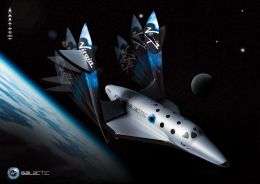University of Leicester scientists funded to design concepts for NASA microgravity

Two University of Leicester scientists have recently been awarded 10,000 to design concepts for scientific experiments which would fly on the upcoming new generation of manned suborbital spacecraft, such as Virgin Galactic's SpaceShipTwo. Suborbital spacecraft are launched into space, but do not have enough speed to achieve orbit. They experience several minutes of microgravity ("free fall") and exposure to the environment of space before falling back to Earth.
Dr Duncan Law-Green and Mr David Boyce of the Department of Physics & Astronomy at the University of Leicester have each been awarded $5,000 by the Universities Space Research Association (USRA) to design microgravity experiments for submission to NASA. They are currently working with the Space Research Centre (SRC) at Leicester on the development of their proposals. The NASA programme was originally conceived by Dr. Alan Stern, former head of NASA's Science Mission Directorate. A successful submission may lead to a pilot programme of suborbital research flights sometime around 2011-2012.
The proposed Leicester experiments deal with the physical and chemical properties of regolith, or the powdery material found on the surface of the Moon and other rocky bodies in the solar system. Improved knowledge of the properties and potential uses of this material will be very important for when humans return to the Moon in around 2020.
Dr. Law-Green commented "Leicester has a long history of research with suborbital rockets. A Leicester experiment will shortly be flying on a Black Brant rocket from White Sands, New Mexico. The advantage of the new commercial suborbital spaceplanes like SpaceShipTwo, is that they will provide scientists with cheaper and more frequent access to space, as well as the ability to have a researcher in place to monitor an experiment in real-time. If we want to fly an experiment again the following day, we will be able to do that more easily with a spaceplane than with a conventional sounding rocket. The research potential of this new generation of commercial manned spacecraft is very exciting."
Source: University of Leicester





















